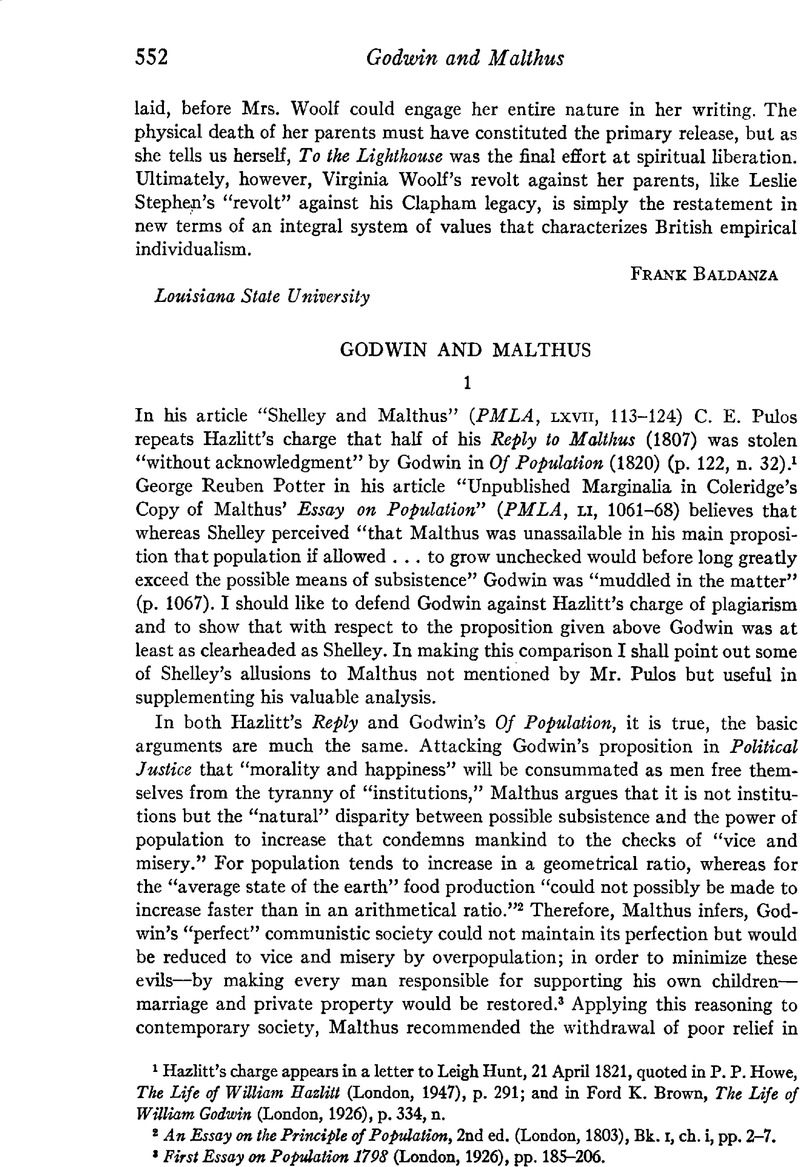No CrossRef data available.
Published online by Cambridge University Press: 02 December 2020

1 Hazlitt's charge appears in a letter to Leigh Hunt, 21 April 1821, quoted in P. P. Howe, The Life of William Hazlitt (London, 1947), p. 291; and in Ford K. Brown, The Life of William Godwin (London, 1926), p. 334, n.
2 An Essay on the Principle of Population, 2nd ed. (London, 1803), Bk. i, ch. i, pp. 2–7.
3 First Essay on Population 1798 (London, 1926), pp. 185–206.
4 Essay (2nd ed.), Bk. iv, ch. iii, pp. 504,507; ch. vi, p. 538, et passim.
5 An Enquiry Concerning Political Justice (London, 1793), Vol. ii, Bk. viii, ch. vii, p. 861; Thoughts Occasioned by the Perusal of Dr. Parr's Spital Sermon (London, 1801), pp. 68–76.
6 Francis Place, Illustrations and Proofs of the Principle of Population, ed. Norman E. Himes (Boston, 1930), “Editor's Introduction,” pp. 33–34. Much of this introduction (esp. pp. 11–42) is devoted to the Malthus-Godwin controversy. See also Kenneth Smith, The Malthusian Controversy (London, 1951), pp. 33–41, 121–131.
7 “Hazlitt and Malthus,” MLN, lx (1945), 215–226; William Hazlitt and the Malthusian Controversy (Albuquerque, 1950), pp. 25–45.
8 “Malthus's Essay on Population,” Annual Review, ii (1803), 296. Cf. Potter (p. 1062), and Kenneth Curry, “A Note on Coleridge's Copy of Malthus,” PMLA, liv (1939), 613615. Note the term “sow-gelder” used by Shelley in Oedipus Tyrannus, i, 70 (cf. Potter, p-1066).
9 Of Population. An Enquiry Concerning the Power of Increase in the Numbers of Mankind (London, 1820), “Preface,” p. vii; and esp. Books iv and v.
10 Ibid., pp. 529–533. Cf. Hazlitt, A Reply to the Essay on Population by the Reverend T. R. Malthus, Complete Works, ed. P. P. Howe (London, 1930–34), i, 202,234–237.
11 James Alfred Field, Essays on Population and Oilier Papers, ed. Helen Fisher Hohman (Chicago, 1931), p. 20.
12 Letters of Percy Bysshe Shelley, ed. Roger Ingpen (London, 1909), ii, 631.
13 “Preface,” Laon and Cylhna, The Complete Works of Percy Bysshe Shelley, Julian Edition (London, 1927–30), i, 242, n.
14 A Philosophical View of Reform, Works, vii, 32–34.
15 Works, v, 266. Cf., as Shelley's possible source, Condorcet, Esquisse d'un tableau historique des progris de l'esprit humain (Paris, 1879), ii, 79–80.
16 See my article “Shelley's Queen Mab …,” Explicator, v (Dec. 1946), item 23.
17 William Hazlitt and the Malthusian Controversy, pp. 41–42.
18 Of Population, pp. 469–472,490,497–498, 560, et passim.
19 Warren S. Thompson, Population Problems, 2nd ed. (New York, 1939), pp. 44–45.